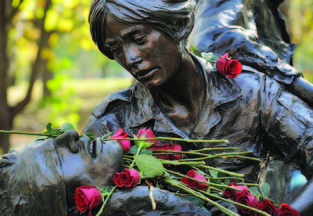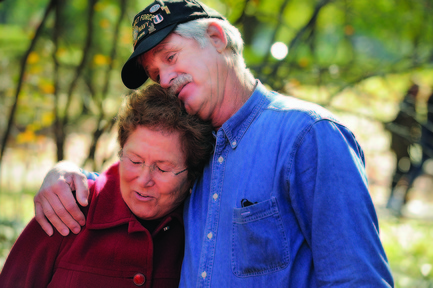From 8 a.m. until just before dark on Monday, the female veterans told their stories.
“I’d go into the medical closet and cry, cry, cry,” one said.
“The men got Purple Hearts. We got broken hearts,” another one said.
“The sound. That sound of the helicopter. You heard that sound and you knew more were coming,” another woman said.
For more than two decades, America didn’t want to hear the stories of nurses and other women who served in Vietnam. They were scorned and disrespected.
When they began pushing for a memorial to the women who served, detractors worried that would open the floodgates to even more memorials — such as for scout dogs.
But supporters said the fantastic, perfect Vietnam Veterans Memorial by Maya Lin — the Wall — was nevertheless incomplete. Former Sen. Frank Murkowski, R-Alaska, said, during one of the 1988 congressional hearings, that there was a “void.”
Larry Sudweeks knows about that.
“Larry had this hole. Like a big old void,” said Larry’s wife, Loretta Sudweeks, as she pointed to Larry’s chest.
The void in Sudweeks’ life goes back to his time in Vietnam, where he spent 45 days in the 93rd Evacuation Hospital in Long Binh.
He knew it was the nurses who kept him alive. But once they made him strong enough, he was flown back home, back to family and away from that place of blood and gauze and death.
Another broken, dying soldier took his bed before Sudweeks got a chance to thank them or even get their names.
His was a common experience.
“I can’t remember your name, but I just wanted to say thanks for saving my life,” read one of the notes left on the National Mall on Monday. It was signed, “One of Many.”
The rest of America had the same problem: never getting the women’s names, never having the time to thank them.
It wasn’t until 1993 that the Vietnam Women’s Memorial was dedicated to honor the ones who volunteered to serve, who stayed while others were flown out, who did the comforting but were never comforted.
There was no draft for women. About 11,000 — most of them nurses — raised their hands and went over on their own.
A few hundred of them came to the women’s memorial in D.C. this Veterans Day to remember, to talk, to embrace, to share and to celebrate the 20th anniversary of their memorial — and two decades of America finally acknowledging their service.
Sudweeks, 66, finally got to say thanks, too.
He lives in California. And he came to the wall a couple of years ago to see the names of his buddies who died, to get that closure.
“But he kept circling that women’s memorial; he was drawn to it,” Loretta said.
He still didn’t know who the women were who saved him.
Meanwhile, Annie Koch Voigt, 68, one of the women who kept him alive those 45 days, wondered about him, too.
This was many, many years after those dark days of war. After children and grandchildren and other wars.
Voigt had this one picture she took of a wounded soldier on an Easter Sunday, when they all wore nurse whites rather than their fatigues. And it haunted her.
She remembered his unusual name. She remembered he was nice and courteous. Most men spent just a couple of days at her evacuation hospital, then were flown away. But Sudweeks was there for weeks and in bad condition.
Part of her didn’t want to learn his fate. You never knew who made it and who didn’t. And, sometimes, it was best not to know.
And part of her didn’t want to revisit that time in her life.
Like the men, the women who served in Vietnam often were scorned when they returned to America. It was especially bad for women, who were judged as harlots for having served among the men. The television show “MASH” didn’t help either. They’d say “Army nurse” and all people heard was “Hot Lips Houlihan.”
So many of them folded their uniforms, put away their caps and stayed silent about their service.
Not anymore.
There is a whole new wave of female veterans now, including women who saw combat and were injured or lost friends on the battlefield.
“We talk to the women who are out there now,” said 1st. Lt. Brenda Jansons, who came from South Carolina for Veterans Day. She still suffers from PTSD from her time in Vietnam. “And you know what? Their story is our story. Nothing’s changed.”
That’s true in the saddest of ways.
“There’s a secondary war,” said Jennie Rose, 66, a retired Army lieutenant colonel.
“The sexual assault of women is the secondary war on them. And it’s there, and it’s very, very real” she said, pointing to herself and another female veteran. “We both lived through it.”
It was Gen. Colin Powell who first publicly thanked the nurses who saved him.
“General Powell said words we’d never heard before,” said Diane Carlson Evans, president and founder of the Vietnam Women’s Memorial Foundation.
Powell dedicated that memorial 20 years ago and returned to the Mall on Monday to remind America what women had done in that war.
“The nurses were the ones who never got respite,” he said, and he asked everyone, on this Veterans Day, to give thanks “especially to the women who served silently.”
Voigt decided to end her silence. She looked up Sudweeks’ unusual name and found his address in California. She mailed him the picture, the details of his wounds and her memories.
“It took me three or four tries to finish reading that card,” Sudweeks said. “It was her.”
At the memorial, all three of them hugged.
And Sudweeks finally said “Thank you.”
Petula Dvorak is a columnist for The Washington Post
Copy the Story LinkSend questions/comments to the editors.




Success. Please wait for the page to reload. If the page does not reload within 5 seconds, please refresh the page.
Enter your email and password to access comments.
Hi, to comment on stories you must . This profile is in addition to your subscription and website login.
Already have a commenting profile? .
Invalid username/password.
Please check your email to confirm and complete your registration.
Only subscribers are eligible to post comments. Please subscribe or login first for digital access. Here’s why.
Use the form below to reset your password. When you've submitted your account email, we will send an email with a reset code.